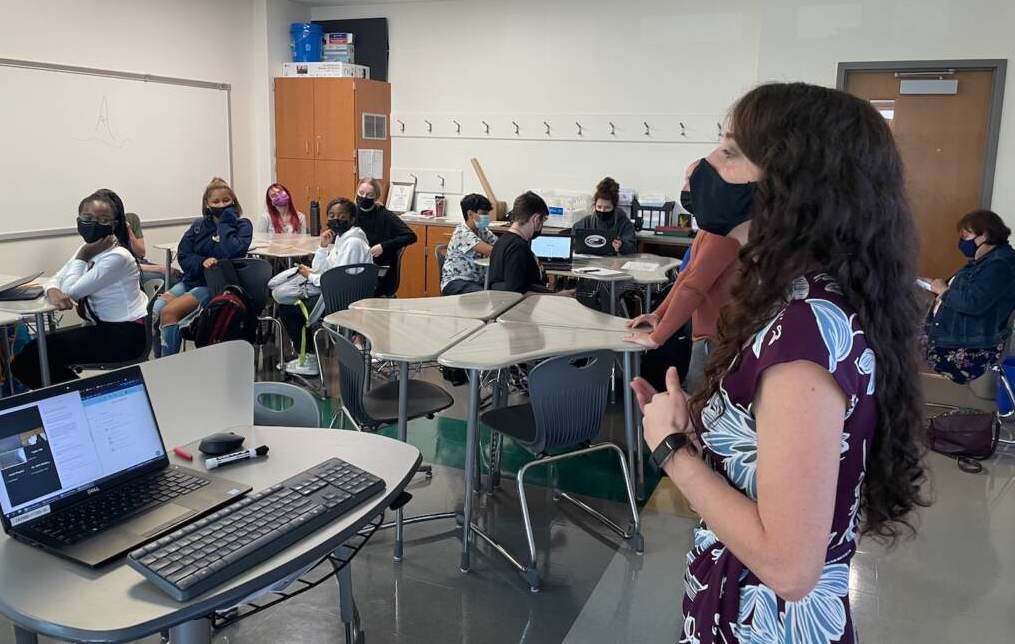‘Tough couple of years’: Delaware students’ academic proficiency far below pre-pandemic levels
For public school students in grades 3 through 8, 42% are proficient in English and 30% in math. One education advocate says the scores reflect a system “in crisis.”

File photo: A new report recommends adding $500 million to $1 billion in funding into Delaware schools. (AP Photo/Nam Y. Huh)
While almost all Delaware K-12 students were back in the classroom last school year — albeit with periodic pandemic quarantines and closures — statewide testing scores remained well below the achievement levels of five years ago.
The state released the scores for its 140,000 public school students Tuesday morning, with state education officials calling the numbers “a baseline for recovery” from the pandemic.
Students in grades 3 through 8 take standardized tests for math and English annually, 11th graders take the SAT, and students in various grades take other tests on their knowledge of science and social studies.
In March 2020, days after COVID-19 first struck Delaware, Gov. John Carney closed schools statewide, so the state did not administer tests that spring. Schools reopened for hybrid or online-only learning for 2020-2021, and fully opened classrooms for the academic year that ended in June.
The new scores for grades 3 through 8 are slightly higher than the previous year but well below the 2017-2018 school year. Below are the results for elementary and middle school students:
- 30% were proficient in math, up from 26% the previous year. Five years ago, 44% were proficient.
- 42% were proficient in English, up from 41% the previous year. Five years ago, 54% were proficient.
Students considered proficient “have exceeded achievement standards and demonstrate advanced progress toward mastery of knowledge and skills of the state standards,” according to the state Department of Education.
SAT scores also dropped across the board. Below are the results for 11th graders:
- 24% were proficient in math. Proficiency was 28% the previous year and in 2017-2018.
- 38% were proficient in the exam’s essay section. Proficiency was 44% the previous year and five years ago.
- 47% were proficient in English, down from 49% the previous year and down 50% from five years ago.
The state tests students in grades 5, 8, and 11 in science, and in grades 4, 7, and 11 in social studies. The tests in those subjects are different than they were five years ago, so no comparison for 2017-2018 is available. Below are the results:
- 21% were proficient in science, down from 24% the previous year.
- 29% were proficient in social studies, down from 30% the previous year.
Scores were lower across the board for Black and Latino students, as well as students with low income. For example, in grades 3 through 8, 15% of Black students, 21% of Latino students, and 21% of students with low income were proficient in math, compared with 30% of all students.
This year, about 95% of students in grades 3 through 8 took the exams, compared with 60% of students last year and about 98% of students five years ago.
Mark Holodick, the state’s education secretary, said summer education programs have been operating up and down the state in advance of the academic year “because we know students are continuing to recover from pandemic-related unfinished learning.”
Holodick added that “recovery doesn’t happen overnight, and our educators are committed to continuing to meet students where they are to provide them the supports and learning time they need to succeed.”
Stephanie Ingram, president of the Delaware State Education Association, which represents teachers and other school workers, said the results demonstrate that “parents, students, educators, and administrators are all trying to navigate through the changes that are still being felt due to the pandemic and how that extends out of the classrooms and throughout our communities.”
Ingram said that while the slight increase in performance by students in grades 3 through 8 is encouraging, “we need to recognize that we are still trying to catch up with the unfinished learning caused by the pandemic. The environment that our students have been learning in since 2020 is very different than it was in the past.”
‘A call to action that we are in crisis’
Laurisa Schutt, who heads the nonprofit First State Educate, says the 2021-2022 results should be “a call to action for every Delawarean that we are in crisis.”
“While testing is a slim snapshot in time with lots of barriers,” Schutt said, “it is the only year-on-year comparison we have to gauge some form of learning health in our state.”
Schutt urged parents to talk to fellow residents as well as school board members and administrators about improving educational outcomes.
“Enabling supported and sustainable conditions where teachers and students thrive belongs to all of us, and requires all of us,” Schutt said.
Theresa Bennett, the state’s director of assessment, says that academic disruptions caused by the pandemic have diluted the value of comparing the numbers this year with recent years, but acknowledges the results show that steep challenges remain in improving what students are taught and retain.
“We have called this past year an opportunity to have a baseline for recovery,” Bennett said during a media briefing in advance of releasing the results. “This is an opportunity for [school districts] to lay the groundwork.
“So they have been spending this year figuring out where their kids are academically and how to progress from where they are forward and determining what our students need as far as social-emotional support. What our teachers need — also social-emotional support — but also professional learning support and also embracing lessons learned. It’s been a tough couple of years.”
The state sets academic standards, but Delaware’s 29 self-governing school districts, as well as about two dozen charter schools, decide their own curriculum and how to implement it.
Monica Gant, who heads the DOE’s academic support section, said the state has begun to address the low proficiency rate in math, for example, by working with subject experts to develop standards, then matching educational materials, training teachers, and getting districts to deliver the “high-quality instruction,” she said.
‘We’re in the midst of that right now,” Gant said. “It’s not enough just to have the materials, but you also need to know how to then put that in place and still fully use those materials.”

The plan has been drafted and is being finalized before being shared with districts, she said.
“We’re still working on it, but it’s around academics, it’s around professional learning, it’s around community connections and family connections. It’s around really looking at cultural responsiveness. And so that is another lens through which we’re looking at this work — making sure as we address the needs of all students, how do we make sure we’re preparing students.”
That’s critical to bridging racial, ethnic, and income gaps in student performance, Gant said. She added that it’s not enough to teach skills if they don’t match the standards.
“If we’re not teaching both, there’s going to be misalignment,” Gant said. “You’re going to see gaps in the assessment results. And those are the gaps that we’re working to close.”
Bennett said each district and charter should examine their own scores, and if students are not performing well, revise and improve their curriculum to address deficiencies.
“They can say, ‘You know what, the kids just aren’t doing well in all of third grade across our district,’” she said. “So we need to go and take a look at our curriculum and instruction. First we need to make sure that it’s in there … And so it gives them an opportunity to know which direction to go in.”
‘Three years essentially of no data. That’s a long time’
Delaware has been conducting statewide testing of students, in various iterations, since 1998. Education officials and advocates have debated their value during that period, but most agree it’s one way to gauge student performance and growth. Purnima Montagne, incoming president of the Delaware PTA, says it’s a necessary but “imperfect tool.”
Montagne says the current results are being released at a time when surveys by her parent-teacher group show that 6 in 10 parents “are worried that their kids are falling behind.”
But the most recent tests are inconclusive at best, she said. “So now you have three years essentially of no data. And that’s a long time, right?
Montagne worries most about kids who have been struggling in grades K-8 but are now entering high school in the upcoming school year.
“It’s just going to get harder and harder,” she said. “There’s got to be a way to shore up and make sure that we’re getting all the kids.”
Montagne added that now more than ever, parents and educators need to put aside philosophical differences about testing and focus on having students meet the standards and acquire the academic skills needed to thrive in the workplace and life in general.
“And really just have everybody put their shoulder against the same problem,” Montagne said, “and push it in the same direction.”

Get daily updates from WHYY News!
WHYY is your source for fact-based, in-depth journalism and information. As a nonprofit organization, we rely on financial support from readers like you. Please give today.





![CoronavirusPandemic_1024x512[1]](https://whyy.org/wp-content/uploads/2020/03/CoronavirusPandemic_1024x5121-300x150.jpg)


